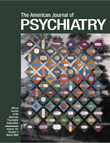To the Editor: We suggest that Robert Louis Stevenson’s classic Dr. Jekyll and Mr. Hyde is a useful primer for patients, their families, and physicians on substance dependence.
The traditional diagnosis given the afflicted doctor is dual or multiple personality disorder. Indeed, not just in common usage, but in the scientific literature
(1), the names “Jekyll” and “Hyde” have become synonymous with a “split” personality. However, given the extreme rarity of multiple personality disorder, especially in a man
(2), compared with the high frequency of a diagnosis of substance dependence, the ubiquitous association of Hyde with Jekyll’s ingestion of his homemade potion, and the evidence given in the following, we believe that Jekyll’s disordered personality and suffering can be explained by substance dependence.
DSM-IV requires that three of seven criteria be met in a 1-year period for a diagnosis of substance dependence. Jekyll meets six of these (criteria 1, 2, and 4–7).
Criterion 1: tolerance
(3, p. 90): Jekyll needs to double or triple the amount used.
Criterion 2: withdrawal (p. 92).
Criterion 4: persistent desire or unsuccessful efforts to cut down or control substance abuse (pp. 91–92). For 2 months Jekyll abstains from his potion, but then he can abstain no longer.
Criterion 5: much time spent recovering from the drug’s effect (p. 100). Jekyll notes that it takes increasingly long for Hyde to wear off.
Criterion 6: important social activities reduced because of substance use. As Hyde, Jekyll refuses to see friends (see, for instance, p. 41).
Criterion 7: substance use continues despite a physical problem that might be exacerbated by drug use. Jekyll notes that he is risking death by using larger quantities of the substance (p. 90). Jekyll’s statement “I swear to God I will never set eyes on him [Hyde] again. I bind my honour to you that I am done with him [Hyde] in this world” (p. 34) is poignantly reminiscent of vain oaths of abstinence made by those suffering from substance dependence problems.
What was Jekyll’s drug of dependence? While alcohol is and was the most common drug of abuse, and Stevenson himself was known to have used alcohol, for a number of reasons we think it was not Jekyll’s drug of choice. First, Jekyll twice mentions alcohol by way of comparison to his potion (pp. 82, 92), with the implication that his potion is not merely ethanol. As well, the cardinal symptom associated with taking the potion—the vivid perception that Hyde is smaller than Jekyll—does not seem consistent with alcohol dependence. Other drugs that Stevenson was known to have used are hashish and opium
(4,
5), but use of neither of these drugs would be consistent with Hyde appearing to be smaller than Jekyll. As well, the often marked activity of Hyde, including the murder of Sir Danvers Carew, would not be consistent with opium dependence.
Cocaine was available when Dr. Jekyll and Mr. Hyde was written, but, if anything, cocaine might have make Hyde feel larger than Jekyll, not smaller. Hallucinogenic drugs can cause a change in body image perception. Although LSD would not be synthesized until the 1900s, Stevenson might have tried naturally occurring hallucinogens such as mushrooms. Or perhaps Stevenson or one of his associates synthesized, accidentally, a hallucinogen in the course of attempting to find a drug to treat Stevenson’s tuberculosis. To leave room for readers’ imaginations, Stevenson may have deliberately left the identity of the drug somewhat vague.
Regardless of whether the drug can be identified, the DSM-IV criteria for dependence can be met interestingly and usefully in this case, independently of identification of the specific substance. Because Stevenson’s novella is short (about 100 pages) and inexpensive (less than $5.00), it can be easily obtained and read. We hope Dr. Jekyll and Mr. Hyde is a useful aid to physicians, patients, and their families in better understanding and treating the common and often serious disease of substance dependence.

